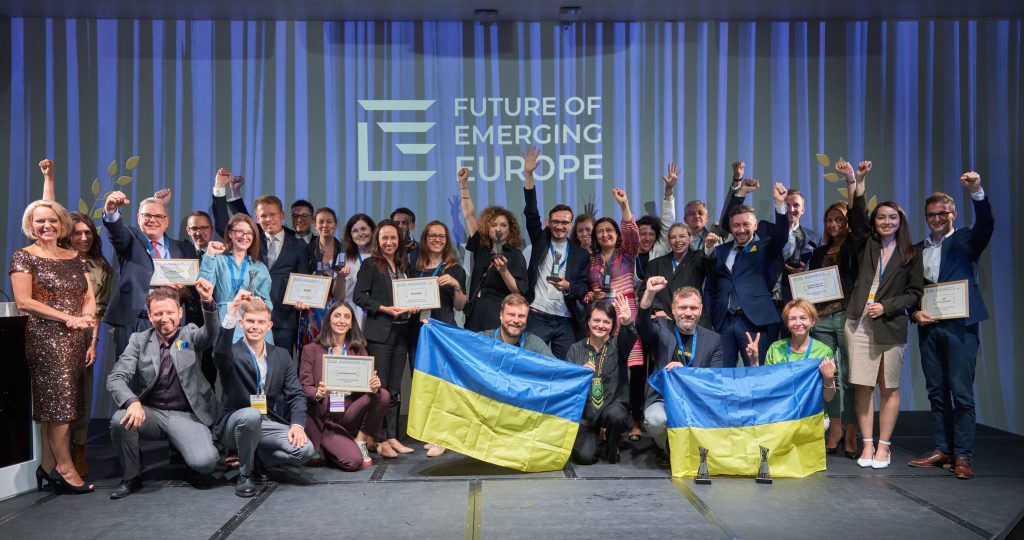While some of us never had any doubt that Ukraine’s IT sector would continue to deliver, war or not, others took more convincing. Fortunately, there were plenty of international advocates for this most techable of countries.
I remember speaking with Peter Appleby from Nearshore America in mid-January this year, about a month before Russia’s full-scale invasion of Ukraine, and discussing the Ukrainian IT sector and its preparedness for any potential threats and challenges.
Not only did I bring up the fact that Ukraine had been invaded in 2014, but that IT companies had been preparing for any and all potential scenarios for eight years.
I even compared Ukraine to Israel, which I had visited a couple of months earlier to explore its start-up ecosystem and which is the start-up nation, despite or perhaps because of its ongoing conflict.
- How Ukraine’s IT industry thrives despite Russia’s war
- Mr Zelensky goes to Washington
- Freedom on Fire: A humanising chronicle of Ukraine’s struggle
On February 24, I was on an early flight to London expecting to head straight to the Ukrainian Embassy to meet the Ambassador and discuss our project, Outlook on Digital Ukraine, which we were planning to launch in early March. And then fly to Kyiv on February 27, to officially launch the Outlook and the Ukrainian Chapter of Tech Emerging Europe Advocates (TEEA).
Due to the invasion, the Outlook had to be postponed in its original format, but our TEEA Ambassador for Ukraine and Director of TechUkraine, Nataly Veremeeva, was so adamant that we launch the chapter, that we decided to do it online. The session gathered hundreds of people from around the world. A few days later we started the Support Digital Ukraine initiative.
It was clear that it was essential to invite international media to not only talk about the war, the people who were and are suffering, but also about the economy and the tech sector, to strengthen the image of Ukraine as a country with great technical capabilities, offering high quality services and steadily delivering to international partners even during wartime.
However, the most important task was to rebuild trust amongst the international community of IT buyers, investors and influencers and highlight the country’s technological advancement, quality, skills and commitment, despite the war.
And we used every single opportunity to do that, especially at international events, even when the discussion was not concentrated on Ukraine, like in Budapest, at the IVSZ SMART Conference, focused entirely on the Hungarian tech sector, or in Seoul in South Korea, at the K.E.Y Platform conference (organised by Money Today Media), where we discussed the impact of the invasion on South Korea’s politics and economy.

A digital war
But it wasn’t until I spoke with a long-time friend of mine and a global business services and IT expert who told me that the “Ukrainian IT sector was dead”, that I realised how important it was to make sure international buyers of IT services did not give up on Ukraine and its sector.
We all needed to make the world know about the digital transformation in Ukraine and how much impact it has had on all civilians, businesses and the way the country is fighting the war.
Public services that could be used during peacetime have now been complemented with those useful during a war. They assisted the army on the frontline, including eVorog, a chatbot for informing the Armed Forces about the movement of enemy equipment, soldiers or collaborators.
They provided financial assistance to entrepreneurs in the regions where hostilities took place, providing support for displaced citizens and access to news so they can get accurate information and eDocument so those people who left home without documents could be identified.
Ukraine has demonstrated that future wars are wars of technologies and sustainable digitalisation is our common global challenge.
We were all happy when the Diia.City project was voted — by the public and a professional jury — the best Modern and Future-Proof Policymaking initiative of 2022 at the Future of Emerging Europe Summit in Brussels. And Yegor Dubinskiy, deputy minister of digital transformation, joined us to share the developments in the country first hand.
“[Our IT companies and IT experts] are the heroes of our economic frontline,” he said, accepting the award.
Now, almost 400 companies are using the framework.
Resilience is key
I had an opportunity to speak with Yegor one more time, in September, at InnovEIT, which I hosted in Warsaw.
“The key term that we have learned is digital resilience and the lesson for Europe is that you can reach digital resilience but not within national borders. For that you need very strong international collaboration and very strong public-private partnership,” he told me during a fireside chat.
The Ministry of Digital Transformation, founded less than four years ago, has from the beginning operated like a start-up. It has made Ukraine the first country in the world where digital smartphone passports became full legal replacements of ordinary documents and where business registration is the fastest across the globe.
The country at war: The voice of Ukrainian Start-ups, a report that Emerging Europe published in August based on a survey carried out among over 150 Ukrainian start-ups, showcased Ukraine’s IT sector resilience. Almost all start-ups said they expected to expand their operations in the short-term. Only four per cent of start-ups believed their operations might have to be scaled back.
In the first few months of the war it was difficult to understand its impact on Ukraine’s IT sector. We attempted to analyse the situation while working on the start-up report.
“Despite the unfavourable conditions caused by Russia’s invasion and its brutal war, the Ukrainian IT sector showed incredible growth in February 2022 – the single-month export figure amounted to 839 million US dollars, 31 per cent higher than January 2022, 45 per cent higher than the monthly average for 2021 and 75 per cent higher compared to February 2021,” Emerging Europe’s senior data analyst, Oleksii Toporkov, wrote in his analysis.
However, March turned out to be less successful – an increase in February was followed by a 38 per cent month- on-month drop. A rebound in April and May followed the downturn and showed signs of stabilisation on the market.
Verified message
And as we expected, growth continued. I was happy to discuss it at the CX Outsourcers conference in Las Vegas in mid-September. And we soon moved on to how the IT sector and the process of digital transformation would contribute to rebuilding the country and its economy as soon as the war is over.
“There is a misconception among a lot of people that Ukraine stopped when the war started, and that is just not true,” Colin Ross, director of Gleeds Ukraine, said during the Ukraine programme at EXPO Real in Munich, which I hosted in early October.
At WebSummit in Lisbon, in early November, we discussed how extremely motivated Ukrainian IT specialists have become.
“To understand this level of motivation, you need to see our channels in Slack, other work group chats and e-mail threads,” Evgen Belousov, deputy CEO at Parimatch Tech, said during a panel discussion I chaired.
“People are very motivated to work because they don’t know what will happen tomorrow and want to ensure their financial stability. Another not-so-obvious point is stress. And the best medicine against this stress for Ukrainians is their work. It is not in the nature of Ukrainians to wait for something to happen, but rather to make things happen and solve problems themselves.”
“If earlier it took us months, we now have many cases when in the morning we have an idea, in the afternoon a team, in the evening we receive funding, and the following day we begin the release,” Natalia Hilevych, CEO at Parimatch Ukraine, added.

Building partnerships
Over the last several months I have witnessed the wide internationalisation of Ukrainian IT companies, as they open offices in literally every corner of the world, from Colombia to Japan. That map includes Bangalore, India’s hottest outsourcing destination, where Miratech recently opened an office.
I am also glad that the IT Ukraine Association (and I must commend Konstantin Vasyuk, Kateryna Tkachenko, Maria Shevchuk, Elena Berestetskaya and the team) alongside other organisations such as Tech Ukraine with Nataly Veremeeva and Iryna Supruniuk and the Kyiv IT Cluster with Liliia Mitina, have looked beyond Ukraine and started partnerships in multiple countries — Poland, Portugal, France, Luxembourg, Portugal, to name just a few.
I still remember a panel discussion at the Polish-Ukrainian Outsourcing Forum (organised by ProProgressio), which I chaired in Rzeszów, Poland in 2017.
“[Poland and Ukraine] should create an outsourcing hub and complement one another in their offer,” Iwona Chojnowska-Haponik, the then director of the Foreign Investment Department at the Polish Investment and Trade Agency (PAIH) said. I am glad that five years later we explored this option further during one of the recent Talk to Ukraine webinars.
Growth continues
And I am glad Emerging Europe became the media partner of the Do IT like Ukraine report prepared by the IT Ukraine Association, which has just been published.
“The war started a new countdown in the history of the industry. According to the results of ten months of 2022, the industry brought six billion US dollars in export revenue to the economy of Ukraine and reached a growth mark of 10 per cent compared to the previous year. According to our forecasts, by the end of the year, the industry will generate 7.1 billion US dollars and 2.2 per cent growth in the volume of exports relative to 2021,” the report says.
Having worked with the Ukrainian IT sector for several years, I must admit that I never had any real doubt that it would continue to deliver, war or not. The confidence that I expressed back in January was well founded.
Unlike many news and information platforms, Emerging Europe is free to read, and always will be. There is no paywall here. We are independent, not affiliated with nor representing any political party or business organisation. We want the very best for emerging Europe, nothing more, nothing less. Your support will help us continue to spread the word about this amazing region.
You can contribute here. Thank you.







Add Comment